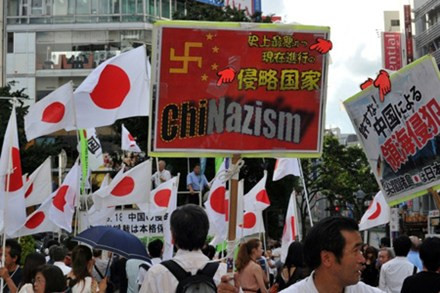Japan will not negotiate with China over Senkaku Islands
Japan's lower house election has ended with a spectacular victory for the Liberal Democratic Party (LDP) of former...
Japan’s House of Representatives election has concluded with a stunning victory for the Liberal Democratic Party (LDP) of former Prime Minister Shinzo Abe. With this result, Shinzo Abe is almost certain to be elected as Japan’s new prime minister at a special parliamentary session on December 26; the composition of the coalition government with the New Komeito Party (NKP) will also be announced soon.

Japanese people protest against China over the Senkaku issue.
Shinzo Abe - the youngest prime minister in Japanese history - when he took office in 2006, promised a new wind of innovation for the aging Japan. The most prominent thing in Shinzo Abe's domestic and foreign policies was nationalism. However, just one year after taking office, Shinzo Abe could not continue his commitments, when his cabinet was engulfed in crisis: within just 9 months, 4 ministers resigned and one minister committed suicide due to a financial scandal. This was a heavy blow to the young prime minister's reputation. In 2007, Shinzo Abe resigned.
Abe, who returned to politics this time, has promised to fix the economy that has been sluggish after years of deflation. The 58-year-old leader said he would improve public spending, ease monetary policy and consider the use of nuclear power in the wake of the earthquake, tsunami and nuclear disaster in Japan.
Immediately after the LDP's victory, China also sent a very clear "message" to the man who will become Japanese Prime Minister - Mr. Shinzo Abe. On December 17, China said that it was "extremely concerned" about the future direction of Japan under the leadership of the LDP, headed by Mr. Shinzo Abe - Chinese Foreign Ministry spokeswoman Hua Chunying told reporters at a regular press conference. Ms. Hua affirmed that China was open to improving relations with Japan, but emphasized Beijing's stance on the disputed islands in the East China Sea, which China calls Diaoyu and Japan calls Senkaku. "China is willing to work with Japan to develop a stable relationship," - she said, adding that the current task is to properly handle the ongoing territorial dispute. Beijing also warned
The moves, following developments in Japanese politics, show that Sino-Japanese relations will continue to become more tense.
According to Laodong-M






